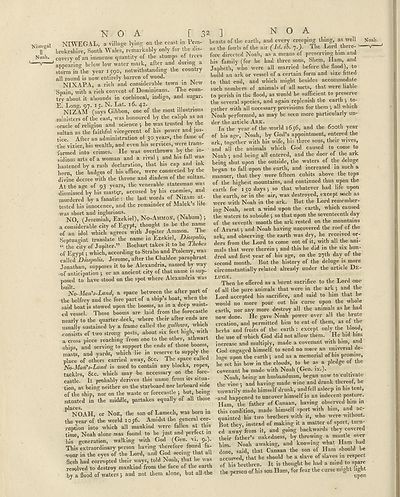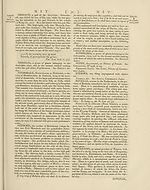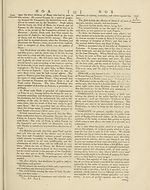Encyclopaedia Britannica > Volume 15, NIC-PAR
(42) Page 32
Download files
Complete book:
Individual page:
Thumbnail gallery: Grid view | List view

N 0 A
[ 32 ]
N O A
NIWEGAL, a village lying on tlie coast in Pem¬
brokeshire, South Wales, remarkably only for tbe dis¬
covery of an immense quantity of tbe stumps of trees
appearing below low water mark, after and during a
storm in'the year 1590, notwithstanding tbe country
all round is now entirely barren of wood. _
NIXAPA, a rich and considerable town in New
Spain, with a rich convent of Dominicans. The coun¬
try about it abounds in cochineal, indigo, and sugar.
E. Long. 97. 15. N. Lat. 16. 42.
NIZAM (says Gibbon, one of the most illustrious
ministers of the east, was honoured by the caliph as an
oracle of religion and science-, he was trusted by the
sultan as the faithful vicegerent of his power and jus¬
tice. After an administration of 30 years, the tame ot
the vizier, his wealth, and even his services, were trans¬
formed into crimes. He was overthrown by the in¬
sidious arts of a woman and a rival $ and his fall was
hastened by a rash declaration, that his cap and ink
horn, the 'badges of his office, were connected by the
divine decree with the throne and diadem ot the sultan.
At the age of 93 years, the venerable statesman was
dismissed by bis master, accused by his enemies, and
murdered by a fanatic: the last words of Nizam at¬
tested his innocence, and the remainder of Malek s life
was short and inglorious. . T 1 v
NO, (Jeremiah, Ezekiel), No-Ammon, (Nahum) j
a considerable city of Egypt, thought to be the name
of an idol which agrees with Jupiter Ammon. Ihe
Septuagint translate the name in Ezekiel, Diospo/is,
“ the city of Jupiter.” Bochart takes it to be Thebes
of Egypt; which, according to Strabo and Ptolemy, was
cMDiospolis. Jerome, after the Chaldee paraphrast
Jonathan, supposes it to be Alexandria, named by way
of anticipation j or an ancient city ot that name is sup¬
posed to have stood on the spot where Alexandria was
^No-Man's-Land, a space between the after part of
the belfrey and the fore part of a ship’s boat, when the
said boat is stowed upon the booms, as in a deep waist-
ed vessel. These booms are laid from the forecastle
nearly to the quarter-deck, where their after ends are
usually sustained by a frame called the gal/oivs, which
consists of two strong posts, about six feet high, with
a cross piece reaching from one to the other, athwart
ships, and serving to support the ends of those booms,
masts, and yards, which lie in reserve to supply the
place of others carried away, &c. The space called
No-Man1 s-Land is used to contain any blocks, ropes,
tackles, &c. which may be necessary on the fore¬
castle. It probably derives this name from its situa¬
tion, as being neither on the starboard nor larboard side
of the ship, nor on the waste or forecastle j but, being
situated in the middle, partakes equally of .all those
places. .
NOAH, or Noe, the son of Lamech, was born in
the year of the world 1056. Amidst the general cor¬
ruption into which all mankind were fallen at this
time, Noah alone was found to be just and perfect in
his generation, walking with God (Gen. vi. 9.).
This extraordinary person having therefore found fa¬
vour in the eyes of the Lord, and God seeing that all
flesh had corrupted their ways, told Noah, that he was
resolved to destroy mankind from the face of the earth
by a flood of waters j and not them alone, but alUhe
beasts of tbe earth, and every creeping thing, as well
as tbe fowls of the air (Id. ib. >].). Tbe Lord there-
fore directed Noah, as a means of preserving him and
his family (for he bad three sons, Shem, Ham, and
Japheth, who were all married before the flood), to
build an ark or vessel of a certain form and size fitted
to that end, and which might besides accommodate
such numbers of animals of all sorts, that were liable
to perish in tbe flood, as would be sufficient to preserve
the several species, and again replenish the earth ; to¬
gether with all necessary provisions for them -, all which
Noah performed, as may be seen more particularly un¬
der the article Ark.
In the year of the world 1636, and the 6ootb year
of his age, Noah, by God’s appointment, entered the
ark, together with his wife, his three sons, their wives,
and all the animals which God caused to come to
Noah and being all entered, and the door of the ark
being shut upon "the outside, the waters of the deluge
began to fall upon the earth, and increased in such a
manner, that they were fifteen cubits above the tops
of the highest mountains, and continued thus upon the
earth for°l days ; so that whatever had life upon
the earth, or in the air, was destroyed, except such as
were with Noah in the ark. But the Lord remember¬
ing Noah, sent a wind upon the earth, which caused
the waters to subside ; so that upon the seventeenth day
of the seventh month the ark rested on the mountains
of Ararat and Noah having uncovered the roof of the
ark, and observing the earth was dry, he received or¬
ders from the Lord to come out of it, with all the ani¬
mals that were therein } and this he did in the six hun¬
dred and first year of his age, on the 27th day of the
second month.' But the history of the deluge is more
circumstantially related already under the article De-
LUGE- . _ 1 T 1
Then he offered as a burnt sacrifice to the Lord one
of all the pure animals that were in the ark } and the
Lord accepted his sacrifice, and said to him that he
would no more pour out his curse upon the whole
earth, nor any more destroy all the animals as he had
now done. He gave Noah power over all the brute
creation, and permitted him to eat of them, as of the
herbs and fruits of the earth : except only the blood,
the use of which God did not allow them. He bid him
increase and multiply, made a covenant with him, and
God engaged himself to send no more an universal de¬
luge upon the earth and as a memorial of his promise,
he set his bow in the clouds, to be as a pledge of the
covenant he made with Noah (Gen. ix.). _
Noah, being an husbandman, began now to cultivate
the vine ; and having made wine and drank thereof, he
unwarily made himself drunk, and fell asleep in his tent,
-and happened to uncover himself in an indecent posture.
Ham, the father of Canaan, having observed him in
this condition, made himself sport with him, and ac¬
quainted his two brothers with it, who were without.
But they, instead of making it a matter of spoit, fuin~
ed away from it, and going backwards they covered
their father’s nakedness, by throwing a mantle over
him. Noah awaking, and knowing what Ham had
done, said, that Canaan the son of Ham should be
accursed, that he should be a slave of slaves in respect
of his brethren. It is thought he had a mind to spare
the person of his son Ham, for fear the curse might light
1 upon
[ 32 ]
N O A
NIWEGAL, a village lying on tlie coast in Pem¬
brokeshire, South Wales, remarkably only for tbe dis¬
covery of an immense quantity of tbe stumps of trees
appearing below low water mark, after and during a
storm in'the year 1590, notwithstanding tbe country
all round is now entirely barren of wood. _
NIXAPA, a rich and considerable town in New
Spain, with a rich convent of Dominicans. The coun¬
try about it abounds in cochineal, indigo, and sugar.
E. Long. 97. 15. N. Lat. 16. 42.
NIZAM (says Gibbon, one of the most illustrious
ministers of the east, was honoured by the caliph as an
oracle of religion and science-, he was trusted by the
sultan as the faithful vicegerent of his power and jus¬
tice. After an administration of 30 years, the tame ot
the vizier, his wealth, and even his services, were trans¬
formed into crimes. He was overthrown by the in¬
sidious arts of a woman and a rival $ and his fall was
hastened by a rash declaration, that his cap and ink
horn, the 'badges of his office, were connected by the
divine decree with the throne and diadem ot the sultan.
At the age of 93 years, the venerable statesman was
dismissed by bis master, accused by his enemies, and
murdered by a fanatic: the last words of Nizam at¬
tested his innocence, and the remainder of Malek s life
was short and inglorious. . T 1 v
NO, (Jeremiah, Ezekiel), No-Ammon, (Nahum) j
a considerable city of Egypt, thought to be the name
of an idol which agrees with Jupiter Ammon. Ihe
Septuagint translate the name in Ezekiel, Diospo/is,
“ the city of Jupiter.” Bochart takes it to be Thebes
of Egypt; which, according to Strabo and Ptolemy, was
cMDiospolis. Jerome, after the Chaldee paraphrast
Jonathan, supposes it to be Alexandria, named by way
of anticipation j or an ancient city ot that name is sup¬
posed to have stood on the spot where Alexandria was
^No-Man's-Land, a space between the after part of
the belfrey and the fore part of a ship’s boat, when the
said boat is stowed upon the booms, as in a deep waist-
ed vessel. These booms are laid from the forecastle
nearly to the quarter-deck, where their after ends are
usually sustained by a frame called the gal/oivs, which
consists of two strong posts, about six feet high, with
a cross piece reaching from one to the other, athwart
ships, and serving to support the ends of those booms,
masts, and yards, which lie in reserve to supply the
place of others carried away, &c. The space called
No-Man1 s-Land is used to contain any blocks, ropes,
tackles, &c. which may be necessary on the fore¬
castle. It probably derives this name from its situa¬
tion, as being neither on the starboard nor larboard side
of the ship, nor on the waste or forecastle j but, being
situated in the middle, partakes equally of .all those
places. .
NOAH, or Noe, the son of Lamech, was born in
the year of the world 1056. Amidst the general cor¬
ruption into which all mankind were fallen at this
time, Noah alone was found to be just and perfect in
his generation, walking with God (Gen. vi. 9.).
This extraordinary person having therefore found fa¬
vour in the eyes of the Lord, and God seeing that all
flesh had corrupted their ways, told Noah, that he was
resolved to destroy mankind from the face of the earth
by a flood of waters j and not them alone, but alUhe
beasts of tbe earth, and every creeping thing, as well
as tbe fowls of the air (Id. ib. >].). Tbe Lord there-
fore directed Noah, as a means of preserving him and
his family (for he bad three sons, Shem, Ham, and
Japheth, who were all married before the flood), to
build an ark or vessel of a certain form and size fitted
to that end, and which might besides accommodate
such numbers of animals of all sorts, that were liable
to perish in tbe flood, as would be sufficient to preserve
the several species, and again replenish the earth ; to¬
gether with all necessary provisions for them -, all which
Noah performed, as may be seen more particularly un¬
der the article Ark.
In the year of the world 1636, and the 6ootb year
of his age, Noah, by God’s appointment, entered the
ark, together with his wife, his three sons, their wives,
and all the animals which God caused to come to
Noah and being all entered, and the door of the ark
being shut upon "the outside, the waters of the deluge
began to fall upon the earth, and increased in such a
manner, that they were fifteen cubits above the tops
of the highest mountains, and continued thus upon the
earth for°l days ; so that whatever had life upon
the earth, or in the air, was destroyed, except such as
were with Noah in the ark. But the Lord remember¬
ing Noah, sent a wind upon the earth, which caused
the waters to subside ; so that upon the seventeenth day
of the seventh month the ark rested on the mountains
of Ararat and Noah having uncovered the roof of the
ark, and observing the earth was dry, he received or¬
ders from the Lord to come out of it, with all the ani¬
mals that were therein } and this he did in the six hun¬
dred and first year of his age, on the 27th day of the
second month.' But the history of the deluge is more
circumstantially related already under the article De-
LUGE- . _ 1 T 1
Then he offered as a burnt sacrifice to the Lord one
of all the pure animals that were in the ark } and the
Lord accepted his sacrifice, and said to him that he
would no more pour out his curse upon the whole
earth, nor any more destroy all the animals as he had
now done. He gave Noah power over all the brute
creation, and permitted him to eat of them, as of the
herbs and fruits of the earth : except only the blood,
the use of which God did not allow them. He bid him
increase and multiply, made a covenant with him, and
God engaged himself to send no more an universal de¬
luge upon the earth and as a memorial of his promise,
he set his bow in the clouds, to be as a pledge of the
covenant he made with Noah (Gen. ix.). _
Noah, being an husbandman, began now to cultivate
the vine ; and having made wine and drank thereof, he
unwarily made himself drunk, and fell asleep in his tent,
-and happened to uncover himself in an indecent posture.
Ham, the father of Canaan, having observed him in
this condition, made himself sport with him, and ac¬
quainted his two brothers with it, who were without.
But they, instead of making it a matter of spoit, fuin~
ed away from it, and going backwards they covered
their father’s nakedness, by throwing a mantle over
him. Noah awaking, and knowing what Ham had
done, said, that Canaan the son of Ham should be
accursed, that he should be a slave of slaves in respect
of his brethren. It is thought he had a mind to spare
the person of his son Ham, for fear the curse might light
1 upon
Set display mode to:
![]() Universal Viewer |
Universal Viewer | ![]() Mirador |
Large image | Transcription
Mirador |
Large image | Transcription
Images and transcriptions on this page, including medium image downloads, may be used under the Creative Commons Attribution 4.0 International Licence unless otherwise stated. ![]()
| Encyclopaedia Britannica > Encyclopaedia Britannica > Volume 15, NIC-PAR > (42) Page 32 |
|---|
| Permanent URL | https://digital.nls.uk/192582244 |
|---|
| Attribution and copyright: |
|
|---|
| Shelfmark | EB.11 |
|---|---|
| Description | Ten editions of 'Encyclopaedia Britannica', issued from 1768-1903, in 231 volumes. Originally issued in 100 weekly parts (3 volumes) between 1768 and 1771 by publishers: Colin Macfarquhar and Andrew Bell (Edinburgh); editor: William Smellie: engraver: Andrew Bell. Expanded editions in the 19th century featured more volumes and contributions from leading experts in their fields. Managed and published in Edinburgh up to the 9th edition (25 volumes, from 1875-1889); the 10th edition (1902-1903) re-issued the 9th edition, with 11 supplementary volumes. |
|---|---|
| Additional NLS resources: |
|

